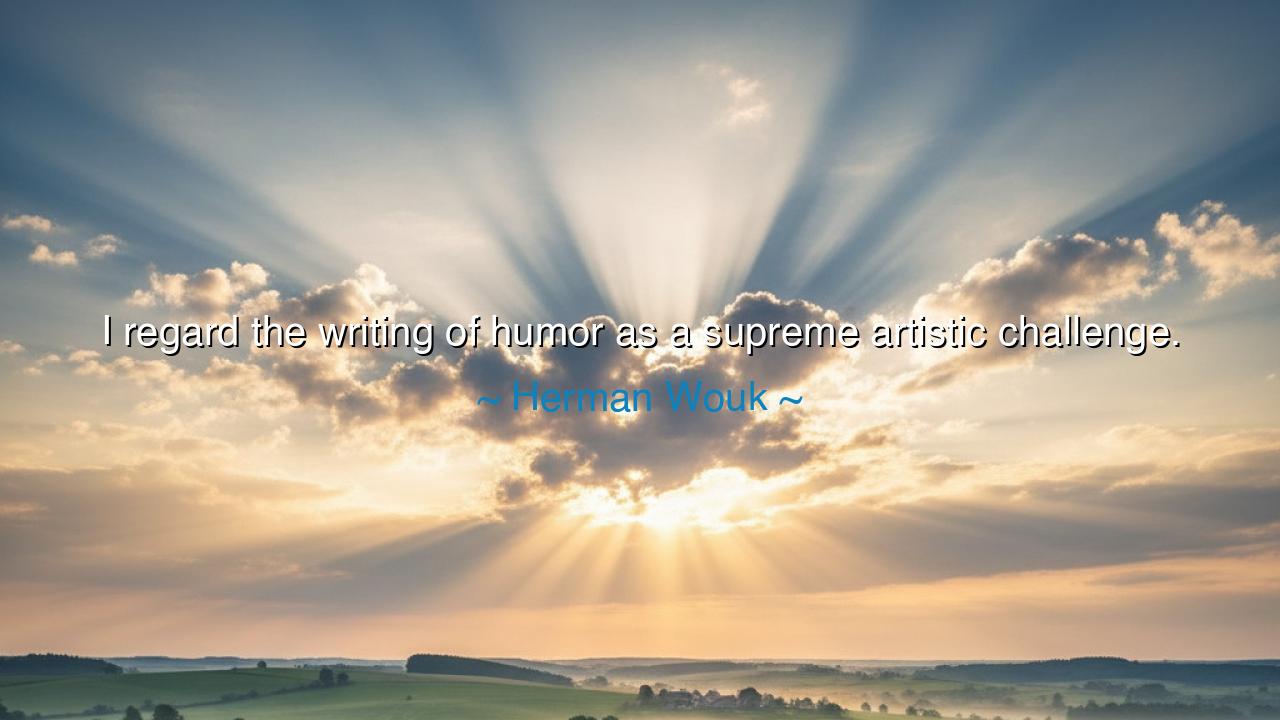
I regard the writing of humor as a supreme artistic challenge.






The words of Herman Wouk—“I regard the writing of humor as a supreme artistic challenge”—resound like a declaration from a craftsman who understood the delicate alchemy between laughter and truth. Beneath this simple statement lies the wisdom of one who recognized that humor, though light in tone, is born of depth; that it requires not only wit, but humanity, courage, and grace. To make others laugh is easy—to make them laugh honestly, without cruelty or emptiness, is one of the greatest trials of the spirit. Thus, Wouk calls it a supreme artistic challenge, for in humor resides both fragility and power—the ability to illuminate the human soul while lifting its burdens.
To write humor is to walk upon a tightrope between joy and sorrow. True laughter, as Wouk understood, comes not from mockery, but from recognition—the sudden spark when one sees the absurdity of life and accepts it with warmth rather than despair. This is no simple craft. The poet may seek beauty in sorrow, the tragedian in loss, but the humorist must find light amidst both. Humor is the art of balance: the laughter that does not wound, the jest that teaches, the smile that redeems. That is why Wouk, whose novels like The Caine Mutiny captured both the tragedy and irony of war, revered it as one of the highest expressions of art.
The origin of this conviction lies in Wouk’s own life and era. A writer who had witnessed war, exile, and human frailty, he knew that humor was not escape, but endurance. In the darkest hours, laughter became the soul’s rebellion against despair. He wrote not of comedy as frivolity, but as strength—the same strength that sustained soldiers in trenches and survivors in ruins. His belief echoes the wisdom of the ancients: that laughter, rightly used, is divine medicine. Aristotle called it the mark of intelligence, and Cicero warned that only those who truly understood humanity could wield it well. For humor, when pure, reveals truth more sharply than anger ever could.
Consider the example of Mark Twain, the American sage of laughter. Twain once said, “The human race has one truly effective weapon, and that is laughter.” His humor pierced hypocrisy and vanity, yet always with compassion. Like Wouk, he understood that laughter and wisdom spring from the same well. It takes courage to speak truth; it takes genius to make truth laugh. Twain, through irony and wit, reached hearts that might have resisted sermon or logic. So too did Wouk, who knew that humor, when sincere, opens the mind because it first opens the heart.
But why call it a supreme challenge? Because humor requires the writer to hold contradiction: to see folly yet remain tender, to witness tragedy yet still smile. It demands humility—for the humorist must laugh first at himself—and empathy, for he must laugh with humanity, not at it. The sword of satire must never cut deeper than the truth it seeks to reveal. The ancients spoke of this balance in the works of Aristophanes, who used laughter to challenge tyranny, yet also to celebrate life. To master humor, then, is to master the art of perspective—to stand at once within the storm of existence and above it.
Wouk’s reverence for humor is also a moral lesson. In an age that prizes irony over sincerity, and derision over wisdom, his words remind us that humor should heal, not harm. The greatest humor uplifts—it brings clarity to confusion, dignity to pain, and humility to pride. To laugh wisely is to forgive; to write humor is to teach the world to do so. For this reason, the humorist bears a sacred duty, equal to that of the poet or philosopher.
Let this be the lesson passed down: seek to understand before you seek to amuse. If you would write or speak with humor, let your laughter be born of compassion, not contempt. Study the human heart, and find within its contradictions the gentle spark of joy that unites us all. Remember that the truest jest is never cruel, and the deepest laughter often hides a tear. In this balance—between mirth and meaning—lies the true test of art and of humanity.
So heed the wisdom of Herman Wouk, who saw laughter not as the escape from life’s weight, but as its transmutation. To write humor, to create joy in a weary world, is to perform an act of grace—to transform suffering into insight, and insight into laughter. It is no small task. It is, indeed, the supreme artistic challenge, and those who undertake it, with honesty and love, stand among the greatest artists of all time.






AAdministratorAdministrator
Welcome, honored guests. Please leave a comment, we will respond soon